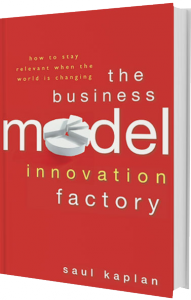We are proud to introduce our latest “reinvention” expert: Saul Kaplan. Saul is a nationally-recognized recognized expert on entrepreneurship and is the author of The Business Model Innovation Factory and founder and Chief Catalyst of the Business Innovation Factory. Saul’s column will be dedicated to advising members of the RP Nation who are in the midst of, or are considering, a second (or third, or fourth) act as an entrepreneur. Enjoy and learn:
 Learn by doing. Constantly test new ideas. Learn, share and repeat. The world is ever changing — stay ahead of the curve. Embrace the art of discovery.
Learn by doing. Constantly test new ideas. Learn, share and repeat. The world is ever changing — stay ahead of the curve. Embrace the art of discovery.
We need to try more stuff. Innovation is never about silver bullets. It’s about experimentation and doing whatever it takes, even if it means trying 1,000 things, to deliver value. Business model innovation requires a lot more experimentation than we are comfortable with today. Tweaking existing business models won’t work. Technology as a sustaining innovation may improve the efficiency of current business models but will not result in the transformation that we all want and need. We need to learn how to leverage technology for disruptive innovation and to experiment with new business models.
Geoffrey Canada, the inspiring founder of the Harlem Children’s Zone in NYC, reminds us of the importance of constant experimentation. Everyone wants to know the one thing that makes a program like Harlem Children’s Zone successful. What is the silver bullet that will allow the program to be replicated with ease across the country? We are always looking for an easy answer. There is no silver bullet and it is not easy to transform any business model or social system. According to Canada, at Harlem Children’s Zone it is doing 1,000 things with passion to help those children succeed. It is about focusing on the customer, in this case, the children within 100 city blocks in Harlem and doing what ever it takes to help them secure a bright future. There is no one thing.
Business model innovation is all about experimentation. It is about combining and recombining capabilities from across silos until something clicks and value is delivered in a new way. It is never just one thing. It starts with a big idea that gets the juices flowing and attracts others with similar passion to the new approach. The big idea has to be translated from the white board on to a real world test bed to demonstrate that the idea is feasible. Starting small and demonstrating progress is key to building credibility and expanding a network of interested stakeholders. An ongoing portfolio of small-scale experiments to fail fast on those without merit and to prioritize those with the potential to scale is critical.
We also must get far more comfortable with hacking capabilities. Capabilities are the amino acids of innovation. They are the building blocks that enable value delivery. Innovation is a better way to deliver value and is often the result of repurposing existing capabilities. Locking capabilities into rigid organization structures and proprietary closed systems gets in the way of unleashing new sources of value and solving many of the important challenges of our time. Innovation is about hacking capabilities. Business model innovation happens when we enable random capability collisions resulting in new and unexpected ways to deliver value.
A good example of the power and potential of hacking capabilities is Microsoft’s (MSFT) Kinect. Microsoft introduced Kinect in November 2010 as a product extension to its Xbox franchise. Kinect adds a very cool capability for Xbox game players by getting rid of the hand held game controller and turning players into their own controllers. Microsoft and cool haven’t been used in the same sentence for a long time. Kinect is cool.
Microsoft predictably launched Kinect with it’s deeply ingrained proprietary product mind set. You could buy Kinect as a bundle with an Xbox or as a separate component to attach to an existing Xbox for $150. While Microsoft views Kinect as a product the global geek community views it as a capability. To geeks, Kinect is a powerful capability screaming to be hacked and repurposed for exciting new uses beyond its use as an Xbox extension. What a bargain for only $150. It’s a hackers dream.
And hack they will. A crowd of makers, programmers, roboticists, and other assorted and sundry geeks are having at it to explore what Kinect can enable beyond Microsoft’s initial intention. It’s only a matter of time before we see new gesture based applications and platforms. How about gesture based health care and education applications to start?
Microsoft’s initial knee-jerk reaction was as expected, negative. Initially the company was caught flat-footed saying it didn’t condone product tampering and threatened legal action against hackers. Think, Apple (AAPL). However, I have to give Microsoft some credit, once market enthusiasm for Kinect became clear and sales starting taking off with 2.5 million of the motion sensors sold within the first month after launch, the company began to get open innovation religion. OK, maybe that’s an exaggeration, but Microsoft stopped threatening hackers with legal action and at least publicly embraced hacker enthusiasm to explore new uses for Kinect. Maybe there is hope that Microsoft can be cool again!
Hacking capabilities can unleash new sources of value and solutions for many of the social system challenges we face today. We should encourage capability hackers and make it easier for them to work their magic. We need to try more stuff. Innovators, hack away. Experiment all the time.
This post originally appeared on the Fortune site here and was adapted from Saul’s new book The Business Model Innovation Factory.










Leave a Reply